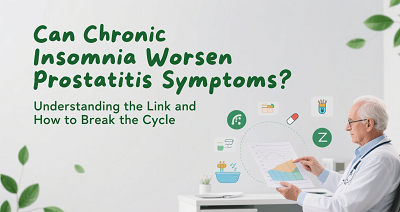Can Chronic Insomnia Worsen Prostatitis Symptoms? Understanding the Link and How to Break the Cycle
If you're living with chronic prostatitis and struggling to get a good night's sleep, you're not alone. Many men with prostatitis report that their symptoms feel worse when they're not sleeping well—and science backs this up.

Insomnia doesn't just leave you feeling tired. It can disrupt your immune system, increase inflammation, raise stress hormones, and make pain feel more intense. For men with prostatitis, especially chronic pelvic pain syndrome (CPPS), this can mean more discomfort, more frequent urination, and more frustration.
In this article, we'll explore the link between insomnia and prostatitis, why poor sleep can make symptoms worse, and—most importantly—what you can do to break the cycle and start feeling better.
How Insomnia Affects Prostatitis
1. Poor Sleep Promotes Inflammation
During deep sleep, your body repairs tissues and regulates immune function. When you don't sleep well, the balance shifts: pro-inflammatory substances like cytokines increase, making inflammation worse. For prostatitis sufferers, that means more swelling and irritation in the prostate and pelvic region.
2. Stress Hormones Go Up
Sleep deprivation boosts cortisol, your body’s main stress hormone. This doesn’t just affect your mood—it can lead to muscle tension, especially in the pelvic floor. Tight pelvic muscles are a common cause of pain and urinary issues in men with chronic prostatitis.
3. Pain Sensitivity Increases
Lack of sleep lowers your threshold for pain. What might feel like a dull ache on a well-rested day can turn into a sharp, burning sensation after a sleepless night. This helps explain why prostatitis symptoms often feel worse after periods of poor sleep.
4. Mental Health Takes a Hit
Chronic insomnia is linked to anxiety and depression, which can amplify your perception of pain and make it harder to manage symptoms. Unfortunately, prostatitis itself can contribute to these emotional issues, creating a frustrating loop that’s hard to escape.
Symptoms That May Worsen With Poor Sleep
If you're not sleeping well, you might notice:
- Increased pelvic pain or pressure
- More frequent or urgent urination, especially at night
- Burning or discomfort during urination
- Erectile dysfunction or reduced libido
- Fatigue, irritability, and difficulty concentrating
What You Can Do: A Comprehensive Approach
Treating prostatitis effectively means looking beyond antibiotics or pain relievers. When insomnia is part of the picture, a holistic approach works best.
1. Reduce Inflammation with Herbal Medicine
One effective way to target both inflammation and symptoms is through natural herbal treatment. The Diuretic and Anti-inflammatory Pill, developed based on Traditional Chinese Medicine principles, is specifically designed to:
- Clear heat and toxins from the prostate and urinary tract
- Improve blood circulation and relieve pelvic congestion
- Alleviate pain, burning, and urinary symptoms
- Support long-term prostate health without side effects
Many men report that after taking the pill consistently, not only do their symptoms improve, but their sleep becomes more restful as pain and discomfort decrease.
👉 Learn more about the Diuretic and Anti-inflammatory Pill here
2. Improve Your Sleep Habits
Good sleep hygiene is essential for healing. Try these tips:
- Go to bed and wake up at the same time every day
- Avoid screens and blue light at least 1 hour before bedtime
- Create a quiet, dark, and cool sleep environment
- Limit caffeine and alcohol, especially in the evening
- Try a relaxing bedtime routine, such as a warm shower, herbal tea, or deep breathing
3. Relax the Pelvic Floor
Tension in the pelvic muscles can make prostatitis symptoms worse—and sleep issues tend to increase muscle tension. Gentle exercises, stretching, and pelvic floor physical therapy can help reduce pressure and pain in the pelvic region.
You might also try yoga poses that stretch the hips and lower back, or even guided breathing exercises that promote muscle relaxation.
4. Manage Stress Naturally
Chronic stress fuels both insomnia and prostatitis. Strategies like:
- Meditation or mindfulness
- Light aerobic exercise (like walking or swimming)
- Acupuncture or massage therapy
- Journaling or therapy for emotional support
...can make a real difference in both symptom severity and sleep quality.
5. Support Recovery with the Right Diet
Diet can impact both sleep and inflammation. Try to:
- Avoid spicy foods, caffeine, alcohol, and processed sugar
- Eat more anti-inflammatory foods like leafy greens, berries, and fatty fish
- Stay hydrated, but avoid drinking too much fluid before bed
- Maintain a healthy body weight to reduce pressure on the pelvic area
When to See a Doctor
While lifestyle changes and herbal therapy can go a long way, it’s important to consult a doctor if:
- Your symptoms worsen despite self-care
- You experience fever, blood in urine, or painful ejaculation
- You're unsure whether your condition is bacterial or non-bacterial
A proper diagnosis ensures you're getting the treatment that fits your condition best.
Final Thoughts
Insomnia and prostatitis are deeply connected. If you're constantly tired, anxious, and dealing with pelvic pain, you're not imagining things—poor sleep really can make prostatitis harder to manage.
But there's good news: by improving your sleep and addressing inflammation naturally, you can break the cycle. Herbal solutions like the Diuretic and Anti-inflammatory Pill, combined with better sleep habits, pelvic floor relaxation, and stress management, offer a powerful way forward.
Want help choosing the right herbal plan for your condition? Visit www.diureticspill.com to learn more or get personalized recommendations.



